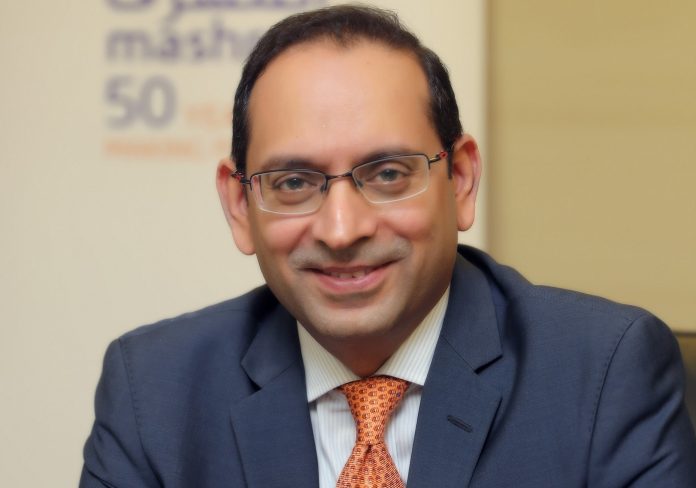Mashreq, one of the leading financial institutions in the UAE, has released its economic outlook report for the second half of 2020. The bi-annual report examines the global economy and outlines key investment trends and developments in the markets.
Major Events during H1 2020
Markets initially began the year 2020 in relatively good shape. Global growth was projected to rise from an estimated 2.9% in 2019 to 3.3% this year. Trade tensions between the US and China were easing, and company earnings trending positively. However, the global coronavirus pandemic and the ensuing lockdowns led to a sharp deceleration in global growth. Global economic output dropped close to 12% in the first quarter, and the IMF expects a global economic contraction of 4.9% for 2020, the most severe slowdown witnessed since the 1930s.
GCC Economic Prospects:
Most GCC states were not spared by the wave of credit rating and outlook downgrades in the first half of the year, following the double whammy of strict lockdowns and plunging oil prices. Oman, Bahrain and Kuwait’s credit ratings were downgraded, while Saudi Arabia’s rating outlook was revised to negative. Qatar and Abu Dhabi’s credit ratings remained unchanged, given their strong fiscal cushions, large forex reserves and prudent macroeconomic policies. Oman, the most vulnerable country in the GCC, has been downgraded twice this year, as a sharp drop in oil prices and slower growth led to a faster deterioration in the government’s balance sheet. Bahrain received its first downgrade in over two years, and will likely require further Gulf backing in the medium term as the government’s finances remain under strain.
In many ways, the pandemic has only accelerated trends that were already under way in the GCC. Before the crisis, GCC countries rolled out robust blueprints of diversifying their economies, while leveraging their areas of strengths in the energy and petrochemicals sectors. Additionally, member countries started focusing on other industries that serve nationwide needs, such as food security, technology and healthcare.
Vipul Kapur, Head of Private Banking at Mashreq Bank, said: “Looking back to January 2020, the global economy appeared to be on relatively stable footing. The eruption of the COVID-19 pandemic sent shockwaves around the world, massively derailing the global economy. Policy makers applied lessons from the 2008 crisis, and we saw a synchronized policy response globally that was swift, bold and unconditional. As a result, many assets recouped a large part of their losses in record time.
“Going forward, there are a number of factors which investors can consider in their decision-making process. As a leading institution committed to providing our clients with valuable knowledge, well researched insights and expertise, our investment outlook for the second half of the year finds three key themes emanating from the market, that investors can examine for themselves and benefit from,” added Vipul Kapur.
Navigating the Second Half of 2020
Below are the key 3 themes and subsequent insights from the report, which investors can draw on to assess the current market situation and outlook:
- Lower for longer interest rates; Interest rates are expected to remain anchored at low levels over a prolonged period of time; hence investors are likely to look for yields which will in turn drive the reflation of higher yielding assets. According to Mashreq, investments in high quality stocks, bonds, and credits providing decent yield pickup should do well in this low interest rate environment.
- Higher volatility making a comeback; A second wave of infections as well as ramp up of trade tensions could spark renewed market stress. This calls for a cautious and prudent course of asset and security selection, while maintaining adequate diversification.
- Thematic investment offering resilience; Trends that were already at the forefront, such as cloud-computing, artificial intelligence, digitization, e-commerce, healthcare innovation and medical technology will be greatly accelerated in a post-pandemic world. The global tech sector returned 6% this year, while bio-tech stocks appreciated by 10% and e-commerce related firms are up more than 14%. According to Mashreq, certain Industries which benefited during the pandemic, will continue to benefit post the pandemic, due to secular shifts and faster adaptation of certain technologies – especially as industries and businesses continue to re-value and shape the way they are setup for the future.
At a Glance: Performance of asset classes
In terms of asset classes, equities currently face two challenges; a low visibility on earnings, and lack of clear direction of the recovery. The advent of a coronavirus vaccine will be a key catalyst for the outperformance of equity markets from current levels. On the credit side, investment grade credit largely benefited from central banks’ backstops, while US Treasuries rallied as investors rushed to safety.
In commodities, oil prices registered the best quarterly performance in 30 years in Q2 2020, making a sizeable comeback after lockdown measures were lifted.Gold’s performance was stellar, posting a double-digit growth of 30% year-to-date, with low yields around the globe supporting the asset class. In regard to currencies, demand for the US dollar is expected to recede as confidence in overcoming the worst of the pandemic is growing. Hence, the euro is expected to benefit from a weaker US dollar. In contrast, the GBP is expected to be negatively impacted by political and economic risks.
DISCLAIMER:
None of the insights within this announcement are intended as a solicitation, offer, opinion, or recommendation by Mashreq to buy or sell any security, or to provide legal, tax, accounting, or investment advice or services.











